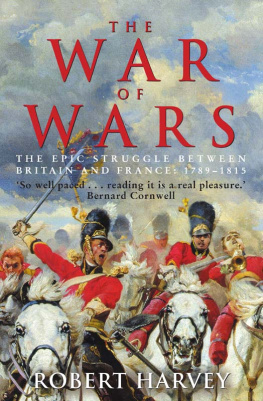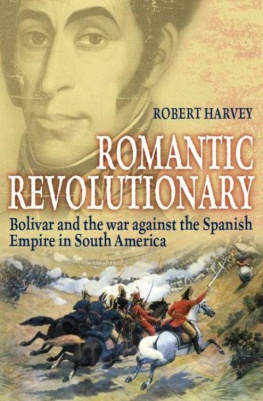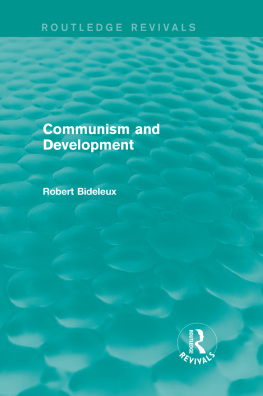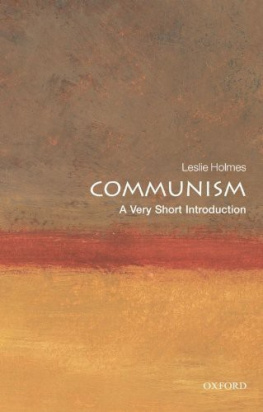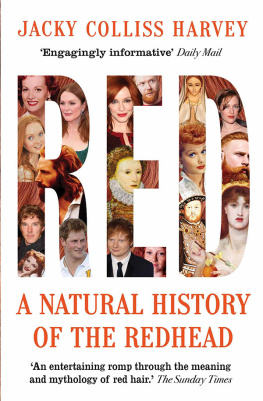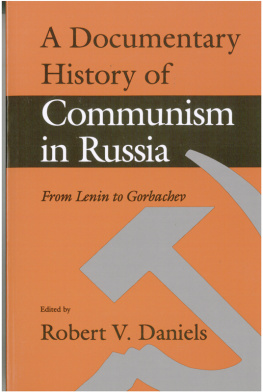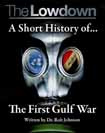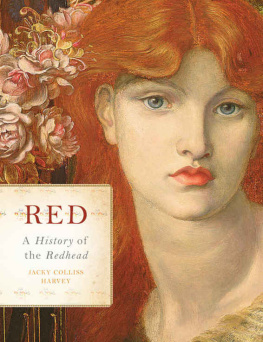Robert Harvey - A Short History of Communism
Here you can read online Robert Harvey - A Short History of Communism full text of the book (entire story) in english for free. Download pdf and epub, get meaning, cover and reviews about this ebook. year: 2004, publisher: St. Martin’s Press, genre: Politics. Description of the work, (preface) as well as reviews are available. Best literature library LitArk.com created for fans of good reading and offers a wide selection of genres:
Romance novel
Science fiction
Adventure
Detective
Science
History
Home and family
Prose
Art
Politics
Computer
Non-fiction
Religion
Business
Children
Humor
Choose a favorite category and find really read worthwhile books. Enjoy immersion in the world of imagination, feel the emotions of the characters or learn something new for yourself, make an fascinating discovery.

- Book:A Short History of Communism
- Author:
- Publisher:St. Martin’s Press
- Genre:
- Year:2004
- Rating:4 / 5
- Favourites:Add to favourites
- Your mark:
- 80
- 1
- 2
- 3
- 4
- 5
A Short History of Communism: summary, description and annotation
We offer to read an annotation, description, summary or preface (depends on what the author of the book "A Short History of Communism" wrote himself). If you haven't found the necessary information about the book — write in the comments, we will try to find it.
A Short History of Communism — read online for free the complete book (whole text) full work
Below is the text of the book, divided by pages. System saving the place of the last page read, allows you to conveniently read the book "A Short History of Communism" online for free, without having to search again every time where you left off. Put a bookmark, and you can go to the page where you finished reading at any time.
Font size:
Interval:
Bookmark:
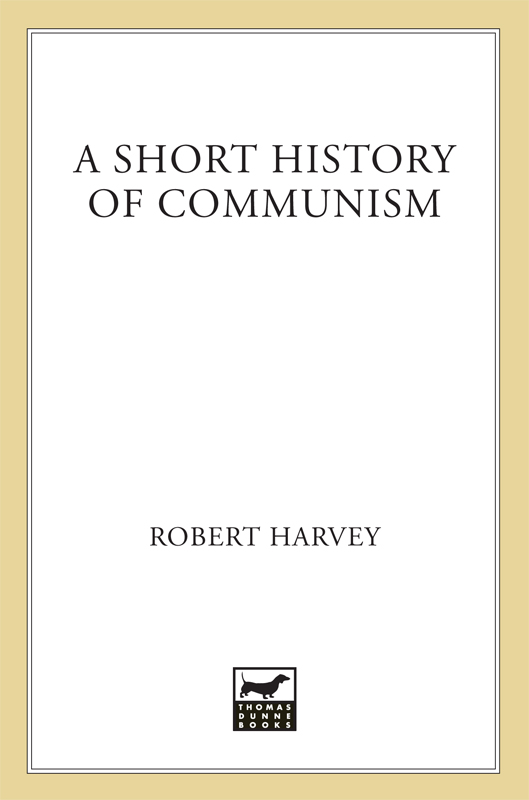

The author and publisher have provided this e-book to you for your personal use only. You may not make this e-book publicly available in any way. Copyright infringement is against the law. If you believe the copy of this e-book you are reading infringes on the authors copyright, please notify the publisher at: us.macmillanusa.com/piracy.
Contents
Note: With a few exceptions, Chinese names are given in Pinyin throughout. In certain cases, they are followed on their first appearance by the traditional form in brackets for those who may be unfamiliar with the Pinyin rendition.
For my father
There have been three great proselytizing religious surges across the world. The first was Christianity, which after initial repression was adopted as the state religion of the Roman Empire and whose humanist message of virtue in this world leading to redemption in the next had an appeal for millions; the second was Islam, which expanded to subdue the Middle East and two thirds of the Mediterranean littoral, propounding a message of respect for the laws in this world leading to paradise in the next. Finally there is Buddhism, which coexisted alongside the Confucian ethic and the power of China, and which was also essentially paternalist.
More than 1,000 years later another religion, born in the nineteenth century, came to dominate some 3.5 billion people, or a little over half the worlds population in the third quarter of the twentieth century. At its peak, people were left cowed by the scale of this explosion into believing that it might soon dominate the entire globe. But just as they feared the worst, it collapsed inwards, leaving very little behind. It was the most spectacular rise and fall in global history.
To other faiths, as to communists, calling Marxism-Leninism a religion may seem offensive. Religion, Marx said scornfully, was the opium of the people. Of course it was not in that it opposed religion and the concept of an afterlife. But in every other respect it resembled one. It elevated its greatest figures Marx, Lenin and Mao to godlike status, while its lesser personalities men like Engels, Stalin, Tito, Ho Chi Minh, Fidel Castro had the status of prophets.
The teachings of Marx, which comprise a vast and impenetrable oeuvre which few read in any depth and even fewer in its entirety, like scripture induced reverence rather than critical appreciation. Lenin and Mao were similarly worshipped (another analogy was that Marx was Old Testament and Lenin, New Testament). Beneath them a huge hierarchical priesthood of Communism was established to propagate the message and convert the people. The scriptures, although difficult to follow and capable of different interpretations, were sacrosanct; pronouncements on any issue had to be made within the proper liturgical framework.
Rituals were created: the huge Central Committee meetings where delegates were required to listen to long speeches, applaud and stand and sit in unison, as at a church service; the Marx and Lenin statues, busts, friezes and murals all borrowed from religious iconography; and even the dingy local Party committee rooms where meetings were held which resembled churches and chapels. As in any church, unqualified obedience and belief were required although terrible schisms ripped the movement asunder, usually concerning arcane forms of ideology which appeared to lack importance. Trotsky split from Stalin, Mao from the Soviet model, Pol Pot from the Chinese model, and Guevarism from Castroism in a bewitching display of internecine quarrelling that sometimes left hundreds of thousands dead and outside observers scratching their heads.
But the religions effectiveness, its ability to organize and, at least at the beginning, its huge mass appeal could not be denied. Then, when it was perhaps at the height of its power, it suddenly vaporized, leaving a clutch of supporters and little comprehension as to what it had really been about. This book chronicles that extraordinary phenomenon, the rise and fall of the Church of Man.
* * *
Why another book about Communism? When the Berlin Wall fell, it was discovered that there are 14 miles of shelves containing personal files in the archives of the Stasi, the East German secret police. If the literature on Communism was stretched end to end, it would surely exceed this. Why add to it, and by a non-specialist at that?
It seemed to me that specialization was precisely the problem. The great majority of books on the subject are densely written works of analysis, many scholarly and discursive, many polemical and most impenetrable to the general reader. There are a minority of superb general books about the communist experience, such as Robert Conquests The Great Terror (which itself became part of the history) and which extend more recently, for example, to Hedrick Smiths The Russians or Fox Butterfields China: Alive in the Bitter Sea. Today books such as The Tiananmen Papers and The Road to Terror are groundbreakers (although essentially compilations).
But there are no general global narrative studies. Communism was a shattering global human experience, affecting by far the largest number of lives in the last century, opening with a big bang with the first communist seizure of power in Russia in 1917 and imploding almost as abruptly with the year of revolutions in 1989, although pockets linger to this day. No book that I know of tries to make sense of it all by bringing together this epic and defining chapter in human history. I know the pitfalls: in spanning more than seven decades of human global history, I will be guilty of many oversimplifications, errors of judgement and straightforward mistakes.
Nevertheless, I believe the effort to draw up a global balance sheet of world communism has been one worth making; although there were huge differences between national experiences, there were huge similarities and cross currents from which a single narrative can be woven. In the process I have arrived at some general conclusions of my own, which I hope are new. It is for the reader to judge whether I have succeeded. Certainly the attempt to bring together the global experience for a new generation, which can have only a distant idea of how the whole extraordinary phenomenon dominated the political perceptions of my own and previous generations both in the East and the West, seems to me to be justified.
Lastly, I hope to bring to the subject, in addition to such skills as a professional historian as I possess, my own direct experience as a journalist. This has included three revolutions (Portugals in 1974, Nicaraguas in 1979 and Afghanistans in 1980), the Eurocommunist phenomenon and being a fly-on-the-wall parliamentary witness of Gorbachevs revolution in the Soviet Union and the reunification of Germany.
I am particularly grateful to the following from whose works I have quoted, or upon whose painstaking research on particular periods I have been able to draw in different sections of the book. I recommend all of these as essential further reading to anyone interested in the subject: J. Arch Getty and Oleg V. Naumov, The Road to Terror; Neal Ascherson, The Polish August; Robert Conquest, The Great Terror and Reflections on a Ravaged Century; Norman Cohn, Warrant for Genocide and The Pursuit of the Millennium; Robert Payne, Marx; Francis Wheen, Karl Marx; Li Xiaojun, The Long March to the Fourth of June; Alexei Myagkov, Inside the KGB; Edwina Moretons reports in The Economist; Fox Butterfield, China: Alive in the Bitter Sea; Gale Stokes, The Walls Came Tumbling Down; Gerald Seagals writings on China; Hedrick Smith, The Russians.
Font size:
Interval:
Bookmark:
Similar books «A Short History of Communism»
Look at similar books to A Short History of Communism. We have selected literature similar in name and meaning in the hope of providing readers with more options to find new, interesting, not yet read works.
Discussion, reviews of the book A Short History of Communism and just readers' own opinions. Leave your comments, write what you think about the work, its meaning or the main characters. Specify what exactly you liked and what you didn't like, and why you think so.

